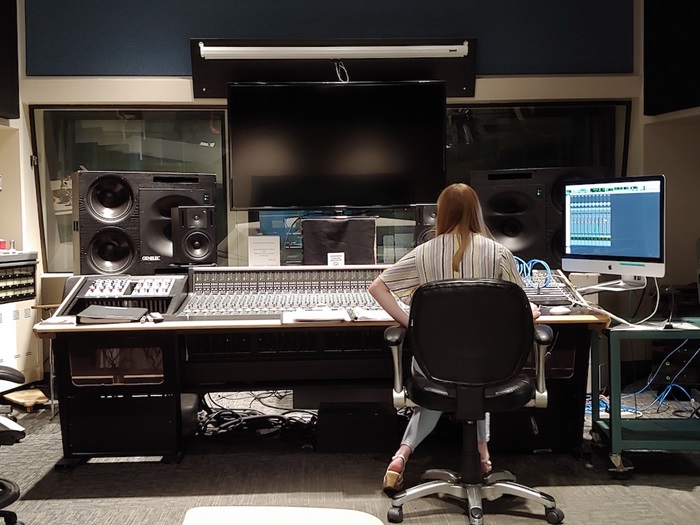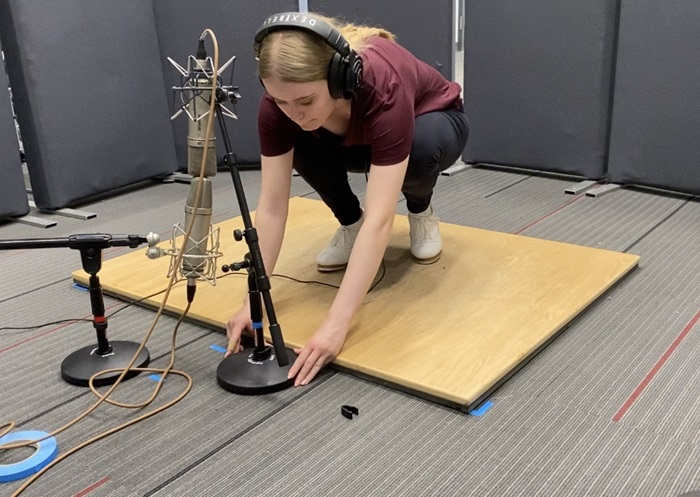Get to Know Katelynn Eckles
Originally planning to go to college in California, CU Denver alum and faculty member Katelynn Eckles discovered the beauty of CAM via LYNX camp.
Nov 9, 2022
Katelynn Eckles ’20, MSRA ‘22 is a CU Denver alum and instructor in the College of Arts & Media’s Music & Entertainment Industry Studies (MEIS) department. Eckles grew up just south of Denver and has called Colorado home her whole life. Although she was originally planning to go to college in California, Eckles attended LYNX camp after graduating high school and fell in love with CU Denver’s music program. Earning a dual emphasis degree in Music Business and Recording Arts set Eckles up for success as she pursued a master of science degree in Recording Arts. She appreciates “the welcoming community” of MEIS and the focus the curriculum has on the current state of the music industry. Eckles began student-teaching while she was completing her graduate degree, assisting with the Concert Promotion and Venue Management courses. In spring 2022, she started teaching the Audio Production I, II, and III courses as a faculty member. When CU Denver isn’t keeping her busy, Eckles works as the Business Operations Manager at Levitt Pavilion Denver. During her non-work hours, she can be found spending time in nature, tap dancing, creating art, practicing mindfulness, and spending time with friends, family, and her two cats.
Questions
- What excites you about working in the music industry?
The most exciting aspect of working in the music industry for me is being around the energy that comes from live performance and art. There is something special about live music that I haven’t found replicated in any other industry; it really does bring people together and help take everyone’s mind off the craziness of our world. I also love the aspect of organizing such a creative field. Being able to bring together the logistics and planning for such an all-over-the-place industry brings me a lot of joy.

2. We refer to Recording Arts as an art, but like many art forms, there is a science to it as well. Can you describe this mix of art and science?
Recording arts is synonymous with audio engineering and has a huge science and engineering aspect to the art form. Audio engineering is the skill of using technology to accurately capture and shape musical works and other audio formats. Audio engineers must understand the science behind sound waves, frequency, microphones, gear, and music theory and use that knowledge to capture a song through a recording and effectively mix the tracks. This requires knowing which types of microphones and which placements will best capture each instrument in each song and knowing how to use equipment such as equalizers and compressors to fine tune the frequency and dynamics of each track and the song a whole. Recording arts also expands into other areas, such as live sound for concerts, sound design for movies/TV and video games, and radio broadcasting.
The two years I spent researching and writing my thesis for my Master of Science in Recording Arts were focused on microphones, microphone placements, and frequency analysis. I conducted experiments and wrote my thesis around the best microphone types and placements to capture tap dance as a percussive instrument. There was virtually no academic research published in this area before, so it turned into a much larger project than I originally intended because I had to start from ground zero and conduct the initial research and experimentation myself. I conducted a multitude of microphone experiments on myself as the tap dancer and presented them to a panel for voting. I also ran an in-depth frequency analysis of tap to discover what the fundamental frequencies of tap dance are and selected microphones that would theoretically best capture these frequencies.
- What is a career goal you have and what are you doing to work toward it?
My top three passions in my career are venue management, teaching, and performing. Ideally, I would love to incorporate all three of these into my career and work across different areas of the entertainment industry. I’m heading into my third year at Levitt Pavilion and hope to continue growing there and potentially own a venue myself one day. I hope to continue teaching music-industry based courses at the university level and work towards that by creating the most engaging and supportive curriculum I can for my students that gets them involved in the industry. I also hope to continue developing my tap performance and hope to one day perform a whole set as the tap dancer in a band.
- When you were a student, how did your professors in MEIS stoke your interest in recording arts?
The professors I had during my time as a student in MEIS really encouraged me to find my own passions and build upon those. By developing skills that I both enjoyed and excelled at, it became easy to engage in the topic. We were also given great hands-on experience, projects, and networking opportunities that lead to great development in the area.
- How do you find ways to be creative in your role as Business Operations Manager at Levitt Pavilion?
I find ways to be creative in that role by spending time brainstorming unique ways to ensure each show and the concert season as a whole run smoothly. I also spend a lot of time designing intricate spreadsheets and actually get a lot of creative fulfillment out of the combination of design, aesthetics, and functionality of my spreadsheets. Finally, the team I work with is a group of creatives that are also all involved in their own music/art projects, and I enjoy hearing about, supporting, and contributing to their creative endeavors as well.
